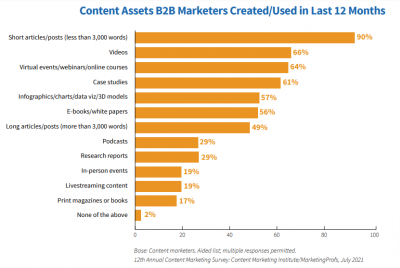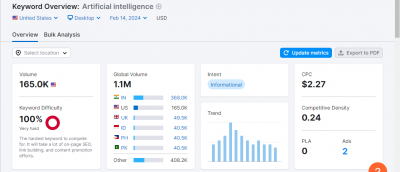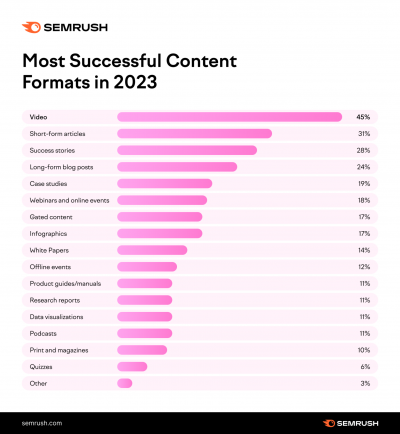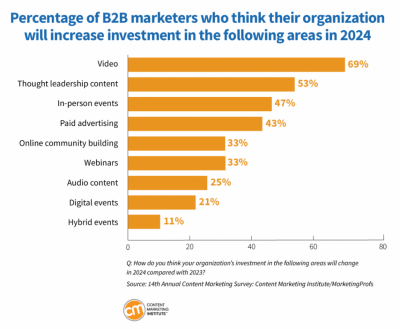Ever wondered why some brands skyrocket to success while others fade into obscurity?
It’s not just about flashy ads or viral campaigns.
The secret lies in mastering the art of online content marketing.
In this article, we’ll explore the significance of content marketing for your brand and its transformative impact on modern marketing strategies amidst today’s oversaturated markets.
You’ll also learn how leveraging content effectively can differentiate your business and carve out a substantial share of the market.
10 Reasons why online content marketing is important for your business
1. Increased visibility and reach
Content marketing helps you increase brand awareness through enhanced visibility and reach. It solidifies expertise, promotes brand awareness, and keeps your business top of mind when it’s time for customers to buy what you sell.
SEO (search engine optimization)
Search engine optimization helps you optimize your content for search engines – be it Google or YouTube.
SEO-optimized content tends to show higher up in search results, leading to increased brand visibility. More visibility translates to more leads and more conversions, improving your bottom line.
Various forms of content
Written content on websites isn’t the only format of content marketing. There are many other content formats, such as long-form videos, short-form videos (YouTube Shorts, Instagram Reels), podcasts, webinars, live online training sessions, etc.
The availability of these many options makes content marketing help your brand increase its visibility and reach even further.
Various platforms and channels
When it comes to content marketing, it’s not just about written stuff on websites. There are lots of other ways to get your message out there, like:
- Creating videos (long and short-form)
- Hosting podcasts
- Doing webinars
- Live online training
Email marketing is another great way to deliver content to your potential customers and folks interested in what you offer.
It’s an effective method for:
- Teaching them about your products
- Sharing important research or case studies
- Announcing new product launches
- Keep them in the loop about any updates to your existing products.
It’s a way to stay connected and keep them informed right in their inbox.
2. Building brand authority
Establishing yourself as an authoritative brand is challenging, yet the substantial rewards are worth the effort.
Once you’ve established authority, prospective customers and clients rely on you and place their trust in your brand—and it’s hard to imagine that trust not leading to a sale eventually.
Here’s how content marketing helps to position yourself as an authority in your industry:
Answering your audience’s questions
Your business thrives on addressing pain points and addressing inquiries. It’s crucial to be the go-to source for the information your audience seeks.
When they find solutions through your brand, they think of your brand as an authority and are likely going to come back and might even purchase your solution to their questions.
Sharing noteworthy research and studies
According to a study by Content Marketing Institute, from a group of B2B content marketers, 61% said they used case studies as part of their content marketing strategy.

Investing in original industry research, surveys, and reports showcases your expertise to your audience.
By sharing this valuable content, you demonstrate your authority in the field.
Writing guest posts
Diversifying your content outreach beyond your owned platforms is essential in content marketing.
Guest posting allows you to contribute articles to other reputable websites with a well-defined audience.
Through guest posts, you can expand your reach and attract new leads. Plus, there’s an added advantage of getting valuable backlinks to your site, which increases your site’s authority and search engine rankings.
Leo Widrich, the co-founder of Buffer, wrote around 150 guest posts and acquired around 100,000 users within the first 9 months of running Buffer.
Expert interviews
Conducting interviews with industry experts and sharing them on your social media platforms provides valuable industry insights to your audience, strengthening their trust in your brand.
Client testimonials
At the heart of marketing is persuading your audience to choose your brand. Glowing reviews from satisfied clients serve as powerful endorsements, significantly influencing purchasing decisions.
3. Targeted audience engagement
Content marketing is laser-focused in its approach. Content creation thrives on a highly targeted audience that truly is looking for what you are offering.
Here are the major benefits of identifying your target audience and tailoring your strategy accordingly:
- Increased brand advocacy: If you manage to convert your target audience into loyal customers, they can evolve into powerful brand advocates. This dedicated group has the potential to amplify awareness of your business, foster trust, and forge emotional connections with your customers.
- Improved customer retention: Understanding your target audience allows you to deliver personalized experiences that hold onto your customers for a long time. It also saves you money, as acquiring a new customer can cost up to five times more than retaining an existing one.
- Better products and services: Your target audience serves as an invaluable feedback source. After all, who understands your products and services better than those they’re intended for? Collecting insights from your target audience can enhance your current products and help develop and launch new ones.
4. Cost-effectiveness
Content marketing is a better investment for your business than traditional marketing. Here’s why.
Low maintenance costs
When you pay for traditional advertisements, sure, you’ll get some new leads and conversions. But the moment you stop paying for them, your visibility vanishes, taking your business down with it.
On the flip side, content marketing plays a long game. Once you put in the effort to create killer content for your brand and get it out there, you don’t have to keep shelling out money for its existence, particularly if you also invest in SEO.
It has a better ROI
Recent data from Neil Schaeffer shows that content marketing costs 62% less than traditional marketing yet generates 3x more leads relatively.

What’s more, according to HubSpot, companies that have a blog get:
- 55% more website visitors, translating to more leads
- 97% more inbound links, leading to better SERP visibility
- 434% more pages indexed in Google
These stats raise the fact that content marketing has a better ROI than traditional marketing.
5. Lead Generation
You saw that content marketing generates 3x more leads than traditional marketing methods. As a result, 80% of B2B marketers rely on content marketing for lead generation.
A big part of content marketing is to produce top-of-the-funnel content that is educational and builds awareness about the problem you address. For instance, you can create detailed guides on topics such as “how to boost productivity using free project management software to attract your target audience.
A common trick to drive your audience is to direct them toward a landing page with a CTA at the end of a content piece. This landing page serves as the gateway for your reader/viewer to transition into a lead by completing a signup form.
6. Analytics and Data-driven Decision Making
When executed effectively, content marketing leaves little room for missteps, seamlessly integrating analytics and extensive data to steer marketing endeavors in the right direction.
SEO Starts With Data
We’ve discussed the pivotal role of SEO within content marketing, but where do you begin in any SEO strategy?
It all starts with finding the perfect keywords.
Content marketing aims at specifically creating content that your audience wants. With the help of SEO tools, you can get access to large datasets that show information about keywords –
- Trending Keywords
- Their search volumes
- Search intent
- Ranking difficulty

This keyword data decides the content for your marketing campaigns.
Content Marketing Keeps The Target Audience Top Of Mind
Content marketing is laser-focused and tailored with the target audience in mind.
As a content marketer, you want to hit the bullseye every time!
Through techniques like customer profiling and using buyer’s journal or creating buyer personas, content marketers meticulously define their target audience before crafting content for marketing purposes.
Analytics Data For Improving Content Strategy
Content marketers heavily rely on analytics to inform their content strategy.
They take into account several KPIs when analyzing data.
For websites, marketers analyze metrics such as monthly pageviews, average session duration, bounce rates, and conversion rates.
For instance, if the average session duration is low, they try to make adjustments to the content strategy to produce more engaging material that captures readers’ attention and boosts dwell times.
Similarly, in the case of email content marketing, marketers analyze KPIs like open rates, response rates, and unsubscribe rates.
If open rates are below expectations, it demands experimenting with different subject lines to boost open rates.
Furthermore, integrating Customer Relationship Management (CRM) and Content Management System (CMS) analytics can provide a holistic view, helping marketers make informed decisions about content creation and audience engagement strategies.
Understanding the differences between CRM vs CMS analytics is crucial for effective content planning and execution.
7. Adapting to consumer behavior
Content marketing plays a crucial role in adapting to consumer behavior in several ways:
Understanding audience needs
Content marketing begins with understanding your audience. By analyzing consumer behavior, such as their preferences, pain points, and interests, you can create content that resonates with them.
Stephen O’Rowe, EMEA regional marketing manager at ActiveCampaign, says, “A lot of companies forget that they need to be thinking about their customers, hearing their feedback and listening to their problems. At the end of the day, you want to solve those problems—so how are you going to do that if you don’t really understand what they are?”
TSL Media Group leveraged Brandwatch, an AI-driven social media listening tool, to curate engaging content tailored to Gen Z for their clients.
By analyzing the behaviors, social sentiments, and brand emotions prevalent among Gen Z on various social media platforms, they formulated content perfectly suited to this demographic.
Building relationships
Content marketing fosters two-way communication between brands and leads.
By engaging with prospects through blog posts, social media updates, videos, or podcasts, brands can initiate conversations, respond to feedback, and build relationships over time.
Adapting to different channels
Video is the most successful content format, followed by short-form articles.

Consumer behavior varies across different channels and platforms. Your audience may like to see a different kind of content on YouTube and a different version of it on your company’s blog.
For instance, while the majority of Gen Z individuals gravitate towards video content, C-suite executives prefer consuming industry-leading articles and insights through reading.
Content marketing allows brands to tailor their content to suit the preferences and habits of users on each platform, increasing the relevance and effectiveness of content.
8. Global accessibility
Content marketing thrives on the Internet, the only place where the entire world converges.
Content marketing empowers businesses to reach a global audience and makes their products accessible to a larger audience beyond any specific geographical location.
Multilingual content
Multilingual websites can engage with 75% more internet users who don’t speak English. Moreover, 60% of consumers worldwide prefer to consume content in their native language.
While English remains a dominant language in content marketing, there is a significant opportunity to cater to diverse linguistic demographics by delivering content in other languages.
9. Competitive edge
Content marketing gives you an edge over your competitors by showcasing your products and services in a manner that is different from your competitors.
A company that publishes research data and customer testimonials will generate many more leads than a company that only focuses on showcasing its product’s features.
Content marketing also involves closely monitoring your competitors’ strategies and formulating ones that are better than theirs.
For example: A competitor gap analysis helps in finding keywords that your competitors are using but you aren’t.
10. Community building
A successful content marketing strategy aims at building a community around your brand, a community that can facilitate the sharing of good experiences among its members.
One-third of internet users closely follow brands on social media platforms. And one person, on average, tells nine others about good experiences associated with your product or service. A community helps in sharing such experiences.
What’s more, 33% of B2B marketers think their organization will increase investment in online community building in 2024.

By engaging with your audience through valuable content, you foster a sense of belonging and connection. This interaction builds trust and loyalty, turning passive consumers into active community participants.
Through comments, shares, and discussions, a vibrant community forms around your brand, amplifying your message and reach. This community becomes a powerful advocate for your brand, organically spreading awareness and attracting new followers.
Conclusion
To sum it all up, online content marketing is an absolute game-changer for your brand. In fact, it’s the way consumers prefer you to reach out to them.
Content marketing expands your brand’s visibility, fosters trust and loyalty with customers, and boosts lead generation, all at a lower cost than traditional outbound marketing methods.
So, make sure to join the ranks of businesses that are using content to maximize profits.
BIO
Saki Tanaka is a dedicated SEO specialist with over 5 years of experience in off-page SEO. At the helm of strategy and execution, she navigates the dynamic world of SEO. Beyond her professional pursuits, she cherishes her love for cats and enjoys a good cup of coffee.


